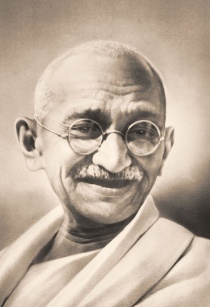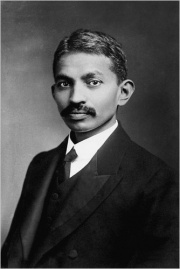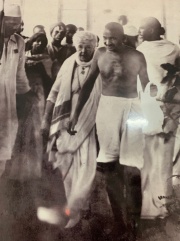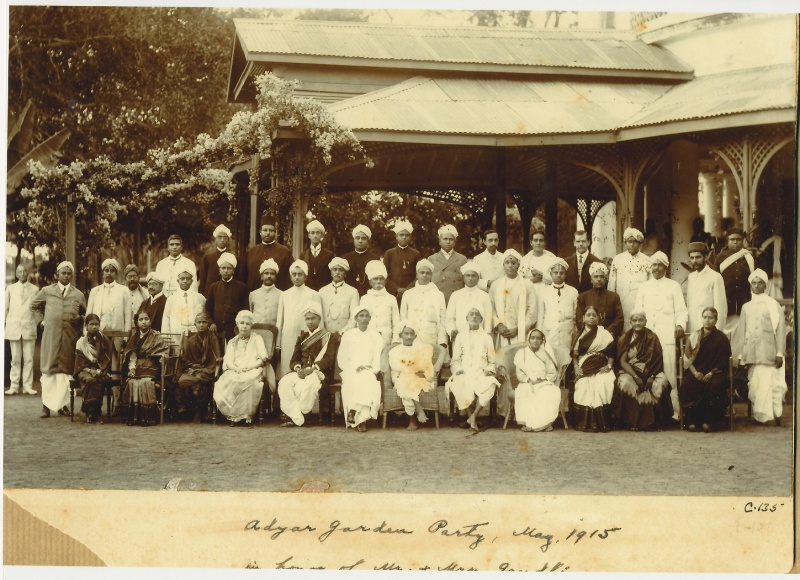Mohandas K. Gandhi

Mohandas Karamchand Gandhi (October 2, 1869 - January 30, 1948), widely known as "Mahatma Gandhi," was a leader of the Indian independence movement against British rule whose policy of nonviolent civil disobedience inspired activists around the world. He was well acquainted with the Theosophical Society in England, South Africa, and India, and knew such prominent Theosophists as Helena Petrovna Blavatsky, Annie Besant, Gopal Krishna Gokhale, and Sir S. Subramania Iyer.
Involvement with the Theosophical Society
In London
Gandhi arrived in London on October 28, 1888. In his Autobiography he says:
Towards the end of my second year in England I came across two Theosophists, brothers, and both unmarried. They talked to me about the Gita. They were reading Sir Edwin Arnold's translation – The Song Celestial – and they invited me to read the original with them. I felt ashamed, as I had read the divine poem neither in Samskrit nor in Gujarati. I was constrained to tell them that I had not read the Gita, but that I would gladly read it with them, and that though my knowledge of Samskrit was meagre, still I hoped to be able to understand the original to the extent of telling where the translation failed to bring out the meaning. I began reading the Gita with them . . . the book struck me as one of priceless worth.[1]
He then began to read Theosophical literature and related works, such as The Light of Asia by Edwin Arnold and Blavatsky's The Key to Theosophy.[2]

In November 1889, he was then introduced to Madame Blavatsky and Annie Besant:
They ['the two brothers'] also took me on one occasion to the Blavatsky Lodge and introduced me to Madame Blavatsky and Mrs. Besant. The latter had just then joined the Theosophical Society, and I was following with great interest the controversy about her conversion. The friends advised me to join the Society, but I politely declined saying, 'With my meagre knowledge of my own religion I do not want to belong to any religious body.' I recall having read, at the brothers' instance, Madame Blavatsky's Key to Theosophy. This book stimulated in me the desire to read books on Hinduism, and disabused me of the notion fostered by the missionaries that Hinduism was rife with superstition.[3]
As Gandhi mentions, Besant's becoming a Theosophist encouraged his abandonment of atheism:
Mrs. Besant, who was then very much in the limelight, had turned to theism from atheism, and that fact also strengthened my aversion to atheism. I had read her book How I became a Theosophist.[4]
Gandhi then became engaged in several organizations that promoted vegetarianism, along with Edwin Arnold and Josiah Oldfield, who shared rooms with Gandhi for a time. He attended the funeral of Charles Bradlaugh, Annie Besant's mentor, on January 30, 1891.
On March 26, 1891, he was enrolled as associate member of London Theosophical Society. His involvement with the Society ended later that year, when he sailed for India on June 12.[5]
In South Africa
When he sailed to South Africa for the second time, he again found comfort within the Theosophical influence:
During my first sojourn in South Africa it was Christian influence that had kept alive in me the religious sense. Now it was theosophical influence that added strength to it. Mr. Ritch was a theosophist and put me in touch with the society at Johannesburg. I never became a member, as I had my differences, but I came in close contact with almost every theosophist. I had religious discussions with them every day. There used to be readings from theosophical books, and sometimes I had occasion to address their meetings. The chief thing about theosophy is to cultivate and promote the idea of brotherhood. We had considerable discussion over this, and I criticized the members where their conduct did not appear to me to square with their ideal. The criticism was not without its wholesome effect on me. It led to introspection.[6]

In India
Both Gandhi and Theosophical Society President Annie Besant were key figures in the movement for Indian independence. While each advocated a different approach to disengagement from the British Empire, they had respect for each other.
Gandhi and his wife visited the Theosophical Society headquarters in Adyar in 1915.
Friends will be interested in the picture of some of the guests at our party in honour of Mr. and Mrs. Gandhi, at the Blavatsky Gardens in Headquarters. The party was under the great Banyan tree so familiar to our readers, and the photograph was taken near the bungalow. Sir S. Subramanian sits in the centre, with Mr. and Mrs. Gandhi on his right and left. Practically all the leading Indians of Madras — Hindus and Musalmans — were present, and we had a very pleasant two hours. Little tables were scattered under the wide-spreading hospitable branches of the great tree, and people ate fruits and cakes and savouries and ices — all Indian — in the friendliest way.[7]

Max Wardall's interview with Gandhi
In 1926, Theosophist Max Wardall reported on his visit to Gandhi in Ahmedabad. After a long description of the place and the "Indian Saint," Wardall asked questions related to the Theosophical Society:
MW: "Have you heard the message announced by Annie Besant that a World-Teacher is soon to appear, and will use the body of Krishnamurti, a Brahman youth, as a vehicle?"
MKG: "Yes, I have heard of it," he said with a faint smile and a shake of the heavy head. "But it does not interest me. Teachers and Prophets have come to the world from time to time to give help to men, and I believe They will come again. The idea of the Coming I am prepared to accept, but that the Divine Teacher will use as a vehicle the body of this or that disciple - such a statement I am unable to verify, to affirm, or deny..."
MW: "You were once a Theosophist. Were you not? I asked.
MKG: "Yes," he replied "When in South Africa I worked with Major Peacock in the building-up of the Theosophical Movement. I am still a Theosophist but I am not in sympathy with the Movement. I am not in favor of any institution which fosters secrecy. Any secret training or discipline like that practised in the inner school of Theosophy offends my democratic sympathies. I want everything open and free to all. I have steadily advocated the leveling of all barriers between peoples of all classes."[8]
Beliefs consistent with Theosophy
Gandhi held beliefs that were consistent with tenets of Theosophy:
I do genuinely perceive that while everything around me is ever-changing, ever dying, there is, underlying all that change a living power that is changeless, that holds all together, that creates, dissolves, and recreates. That informing power of spirit is God, and since nothing else that I see, merely through the senses, can or will persist, He alone is. And if this power is benevolent or malevolent, I see it as purely benevolent, for I can see that in the midst of death, life persists. In the midst of untruth, truth persists. In the midst of darkness, light persists. Hence I aver that God is life, truth, light. He is love. He is the supreme good.[9]
Additional resources
Articles
The Union Index of Theosophical Periodicals lists:
- 5 articles quoting Mohandas K Gandhi.
- 1 article about Mohandas K Gandhi.
- 12 articles quoting Mahatma Gandhi.
- 15 articles about Mahatma Gandhi.
- Thacker, Elizabeth Lorelei. "Mahatma Gandhi and the Theosophical Movement (1)" The Canadian Theosophist 64.5 (Nov-Dec 1983), 97-106, 117. This article in two parts is a very thorough and well-researched examination of MKG and his connections with the Theosophical Movement.
- Thacker, Elizabeth Lorelei. "Mahatma Gandhi and the Theosophical Movement (2)" The Canadian Theosophist 64.6 (Jan-Feb 1984), 123-130.
- Gandhi, Mohandas Karamchand in Theosophy World.
Audio
- Kingsley Hall Address, recorded on October 17, 1931 while Gandhi was in London at the Second Round Table Conference. Gandhi speaks about spiritual laws governing humanity. Another version is available at the India Political Center website.
- Gandhi: Architect of Indian independence, narrated by Rajan Datar in "The Forum." Other contributors are Tridip Suhrud, Karuna Mantena, and Anil Nauriya. Posted by the BBC on August 11, 2022. References to Theosophy beginning at 08:27.
Video
- The Gandhi You May Not Know by Rajmohan Gandhi. Presented on April 24, 2008 at the Theosophical Society in America.
Notes
- ↑ Mohandas Karamchand Gandhi, The Story of My Experiments with Truth (Ahmedabad: Navajivan Publishing House, [1940]), 50.
- ↑ Stanley Wolpert, Gandhi's Passion: The Life and Legacy of Mahatma Gandhi, Oxford University Press, 2002. Excerpt online at Beliefnet.com.[1]
- ↑ Mohandas Karamchand Gandhi, The Story of My Experiments with Truth (Ahmedabad: Navajivan Publishing House, [1940]), 50-51.
- ↑ Mohandas Karamchand Gandhi, The Story of My Experiments with Truth (Ahmedabad: Navajivan Publishing House, [1940]), 50-51.
- ↑ "Chronology of Mahatma Gandhi's life/England 1888-1891", Wikisource.
- ↑ Mohandas Karamchand Gandhi, The Story of My Experiments with Truth (Ahmedabad: Navajivan Publishing House, [1940]), 196-197.
- ↑ Annie Besant, "On the Watch-Tower" The Theosophist 36.9 (June, 1915), 189.
- ↑ Max Wardall, "A Visit to Ghandi [sic]" The Messenger 14.1 (June 1926), 1-3.
- ↑ Kingsley Hall Address, recorded on October 17, 1931 in London.